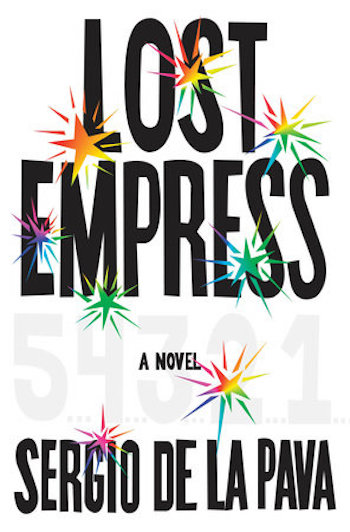Book Review: “Lost Empress” — A Novel That Takes Chances
Lost Empress’ ambition is admirable, and while the over-the-top style gets away from itself, it’s lively and sometimes entertaining.
Lost Empress by Sergio de la Pava. Pantheon, 640 pages, $29.95.
By Vincent Czyz

I was inclined to like Sergio de la Pava’s new novel, Lost Empress, before I’d read a word of it. Here’s an author who works as a public defender in New York City—not in academia teaching creative writing as so many do—and hails from Paterson, NJ, a city where much of the novel takes place and with which I was once on intimate terms. A former feature writer for The New Jersey Herald-News, I spent a lot of time covering the burgeoning art scene in Paterson. And long before that my brothers and I had trained at a boxing gym in Paterson (my older brother turned pro, eventually taking home a couple of world titles). So I was chuffed to see a local boy, as it were, making good—very good if you go by the reviews: de la Pava rates comparisons to postmodern heavyweights Thomas Pynchon, William Gaddis, and David Foster Wallace in, among other publications, The New Yorker, The Wall Street Journal, and The Economist.
Unfortunately, the reviewers seem to have been influenced more by de la Pava’s background than by his novel. It’s mostly poor man’s Wallace and still poorer man’s Pynchon. Of Gaddis I saw no trace, other than a humorous name or two (hardly unique to Gaddis), and I get the feeling the reviewers were at pains to pump up the hype.
The difficulties begin on page 1 with sentence one: “Because it will remain true, even then: that we will only see before affect after, only sense the immediate, and dumbly feed on the invisible other.” There is the slightly off-putting “then” (when?), the somewhat confusing “see before affect after,” which isn’t much clarified by what follows, and the ambiguous “invisible other” (who or what?). My best guess for the knottiest phrase is that before and after are entities unto themselves: “we only see Before affect After,” etc. although I’m still not sure what exactly de la Pava meant to convey with the sentence as a whole. If it were a one-time thing, I wouldn’t bother with it, despite the fact that a novel’s first sentence is second in importance only to the last. The writing, however, is often difficult to parse, straight-up sloppy, punctuated badly, and simply does not warrant comparison with the meticulous linguistic engineering of Pynchon, Gaddis, and Wallace. What are we to make, for example, of “People rushing out in disaster-movie egress”? The problem is that rushing out and egress are essentially synonyms (people are egressing in disaster-movie egress) although it’s true that egress here is used as a noun, but that’s a bigger problem; it just doesn’t make sense. Mode is probably the word de la Pava was looking for. When he writes that “she knows enough to sense that Nina is crushed,” he seems unaware that as a verb “sense” excludes cognition—no knowledge necessary. In other mistakes in meaning, he uses “disinterested” (objective, neutral) when he means “uninterested,” “assonances” where he’s talking about consonances (and the plural is not called for), and singe (as a plural noun!) instead of scald. We also get this paragraph, which seems to think it’s cute but is closer to plug-ugly.
Maybe that’s supposed to be a testament to [a doctor’s medical] training; but to someone who’s been intimately subjected to it, the training is like everything surrounding it, unimpressive. For four years he impressed no one; but while that failure to impress certainly impressed him, evidence of sound ambient judgment is at least mildly impressive, the fact that his failure to impress made no lasting impression only served to impress upon him how wildly unimpressive the whole enterprise was.
Too often de la Pava strains for the word most likely to show up in the verbal section of the GRE or stretches for the phrase/metaphor Wallace might have come up with (note: some of DFW’s word choices didn’t work either). De la Pava seems bent on using a $50 word whether or not it suits the occasion, throwing in “interregnum” where pause would have been better, using “inappositely” in a phrase that would be better off without any adverb at all let alone that one, and sticking in “instantiates” instead of the more colloquial exemplifies. Again, if this didn’t happen on so many pages—several times on some pages—in a book that has more than 600 pages, I wouldn’t nitpick. But each out-of-place word, each misguided phrase, each stilted sentence or overwrought image grates on the inner ear, and after a while reading becomes a chore.
Unfortunately, this manic narrative voice was meant to carry a farcical plot that’s not really capable of standing on its own. Nina Gill attends an “estate settlement meeting” and discovers that her father, owner of the Dallas Cowboys (in the fictional world according to de la Pava), has left her, not America’s Team, but the Paterson Pork, the worst franchise in the moribund Indoor Football League (IFL). Her brother, Daniel, a business man interested in profit rather than in passes completed or rushing yardage, is the new owner. We are given to believe this is a wrong that stinks to high heaven because Nina actually knows football. Heck, as a seven-year-old she invented the shotgun formation with its signature long snap to a set-back QB. To add to the cartoonish quality of the novel, here’s seven-year-old Nina talking football with Dad: “The league is becoming more pass-oriented. I say we go with only three defensive linemen and four linebackers. One of the four would come on every passing down giving you your four pass rushers but all four would also be available to drop into pass coverage depending on the play call and formation.” (Don’t be surprised; Nina is spectacular in every way—taller, more capable, more articulate, more athletic, more charismatic than anyone in the room at any given time.)
Determined to take revenge on her brother, who actually made a fair offer of co-ownership that she rejected because she literally refused to share, Nina takes over the Paterson Pork. Conveniently enough, the NFL owners happen to be locking out the players this season over—what else?—a monetary dispute. If at this point you don’t know where the plot is going—that Nina is going to resuscitate the IFL and the Cowboys are going to wind up playing the Paterson Pork—you haven’t read much genre fiction. If you don’t know who wins, you haven’t watched The Longest Yard (or any other Hollywood film). But if that makes the plot sound like one of Disney’s G movies (“We’re supposed to fear a woman?” protests an NFL owner), that’s actually faint praise; at its worst, the action strays into I Love Lucy territory. Nina, for example, goes to the all-important estate meeting without a lawyer. When it becomes clear she desperately needs one, she goes into the hall, lays hands on Dia Nouveau, a part-time delivery girl, and presents Dia as her attorney—because high-powered lawyers are college students who wear their university sweatshirts to legal proceedings. This gives de la Pava a chance to have Dia deliver lines worthy of a bad sitcom, such as “Moreover, you can expect a happiest corpses petition from me before lunch.” It gets better—or maybe worse. The bewildered young woman, whose name means new day in case you didn’t know one was coming, is anointed deputy commissioner of the IFL although I’m not sure how Nina managed that one since she inherited a team, not the league.
There’s an equally unlikely but notably more interesting subplot that deals with a Riker’s Island inmate named Nuno, who is basically Nina’s male counterpart (hence the near-identical tags). He is smarter, stronger, more cunning, better versed in philosophy and literature than anyone in the novel—except maybe Nina. Nuno goes to Riker’s on purpose—to steal a painting by Salvador Dali (the Spaniard actually donated one of his canvases to the prison although it was eventually stolen and never recovered). As it turns out, Nina is involved with a criminal organization called the Absence, and she’s the one behind the scheme to swipe the Dali.

Author Sergio de la Pava — he seems bent on using a $50 word whether or not it suits the occasion. Photo: courtesy of the artist.
The characters aren’t any more believable than the plot, maybe because the narrator is busy with his one-man show and doesn’t really like sharing the spotlight anymore than Nina wants to share the Cowboys. Further detracting from the believability of the principles is the dialogue, which is so choreographed no one would mistake it for reportage of things actual people say to each other. Once again, the template seems to have been the sitcom, and while De la Pava’s banter tries very hard to be funny usually it just winds up being contrived.
During the course of Nina’s and Nuno’s adventures, we learn a lot about football and a penal system in desperate need of reform, but there’s one more element in the novel that really can’t be overlooked: an infatuation with quantum physics and heady conjecture about Time, Space, and Consciousness. While normally I’d welcome these elements, the excursions into the quantum field feel tacked on—either imported via the narrator or delivered in a series of unbroken monologues by a character known as the Theorist. Moreover, some of the content seems to have been guided by the feel-good conclusions drawn in the documentary What the Bleep Do We Know? rather than by the consensus of practicing physicists.
I also found the ending disappointing—probably because I found the ending to Don DeLillo’s Underworld overinflated and flat. In DeLillo’s novel that last page is a long paragraph building up to a single word that stands alone as a sentence. The words with which the two authors crown their books are different; the buildups themselves are different, but in neither case did I find the final flourish convincing.
The most heartening thing about this book is the chances it takes (and a publisher that allows de la Pava to take them). The ambition here is admirable, and while the over-the-top style gets away from itself, it’s lively and sometimes entertaining. Unlike many a would-be author, de la Pava should quit his daytime job—or at least bust lawyering down to a part-time gig. The gap between what this novel is and what it could have been was well worth shrinking.
Vince Czyz is the author of The Christos Mosaic, a novel, and Adrift in a Vanishing City, a collection of short fiction. He is the recipient of the Faulkner Prize for Short Fiction and two NJ Arts Council fellowships. The 2011 Capote Fellow, his work has appeared in many publications, including New England Review, Shenandoah, AGNI, The Massachusetts Review, Georgetown Review, Quiddity, Tampa Review, Boston Review, and Louisiana Literature.

